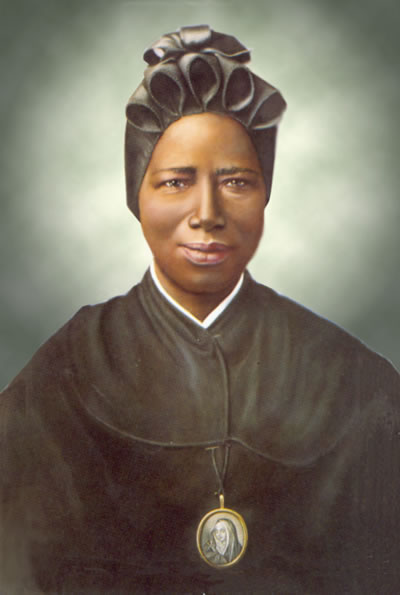
Survivor of the Slave Trade, Catholic Convert, Model of Forgiveness
St. Josephine Bakhita
loving mercy is powerfully displayed when He takes a life of tremendous suffering and transforms it into a marvelous work of grace. Such is the case of this great saint, who from a young age was exposed to cruel and unjust tortures as a slave. Bakhita was born in 1869 in Southern Sudan, where she was kidnapped by Arab slave traders at the age of nine. The trauma of this event caused her to forget her name, so she was called “Bakhita,” which means, “fortunate one,” and was forced to convert to Islam. She successfully escaped from the Arabs only to be captured by another slave trader. Her life as a slave continued, and she was passed from owner to owner until eventually being enslaved by a Turkish officer and his family.
The most terrifying memories were experienced by Bakhita while she was in the clutches of this cruel family, who treated all of their slaves with utter contempt. They regularly subjected her to torture and humiliation. Flogging was a common occurrence. When Bakhita was thirteen, she experienced the most excruciating pain as she was tattooed by her owners, who cut 114 incisions into her body and treated them for a month by pouring salt into the wounds. Her life changed radically at the age of fourteen, when she was bought by the Italian vice-consul, a man who treated her with the kindness and love of a father. After unsuccessfully trying to return her to her family, he brought her with him to Italy. This gentle benefactor became friends with a wealthy woman by the name of Signora Michieli, who was very fond of Bakhita. She asked for Bakhita to be given over to her, and for six years Bakhita lived mainly in Venice, where she served as the nanny for the Michieli’s daughter Mimmina.
“O Lord, if I could fly to my people and tell them of your goodness at the top of my voice, oh how many souls would be won!”
The suggestion was made by the family steward that Bakhita should have the opportunity to learn the Christian faith. Agreements were made, and she went with Mimmina to a Catechism Institute run by the Canossian Sisters of Venice, a congregation founded to educate young girls and serve in parishes and hospitals. Bakhita experienced a powerful transformation, and came to know of the Master who had always loved her unconditionally, even while she was in the deep abyss of desolation in her youth. After years of many temporary homes, she finally found her true home at the convent in the embrace of the Lord. Bakhita was moved by His goodness and love, and later said, “O Lord, if I could fly to my people and tell them of your goodness at the top of my voice, oh how many souls would be won!” The Michieli family moved to Sudan in 1889, and attempted to take Bakhita with them. Although her heart broke to leave the family that had been so kind to her, Bakhita firmly refused to leave. Because Italy outlawed slavery, civil law dictated that she had been emancipated upon reaching Italian soil, and was therefore Bakhita was a free woman.
She remained with the sisters at the Institute and, on January 9th 1890, Bakhita was baptized, taking the name Josephine. She later kissed the baptismal font and said, “Here, I became a daughter of God.” Bakhita entered the Canossian community where she lived until her death in 1947. Her sisters told of her “constant sweet nature, exquisite goodness, and deep desire to make the Lord known.” She was a model of gratitude and mercy, realizing the Lord had drawn her out of suffering to Himself. “If I was to meet those slave raiders that abducted me and those who tortured me,” she said, “I’d kneel down to them to kiss their hands, because, if it had not been for them, I would not have become a Christian and religious woman.” Josephine Bakhita was canonized on October 1st, 2000.
Feast Day: February 8

